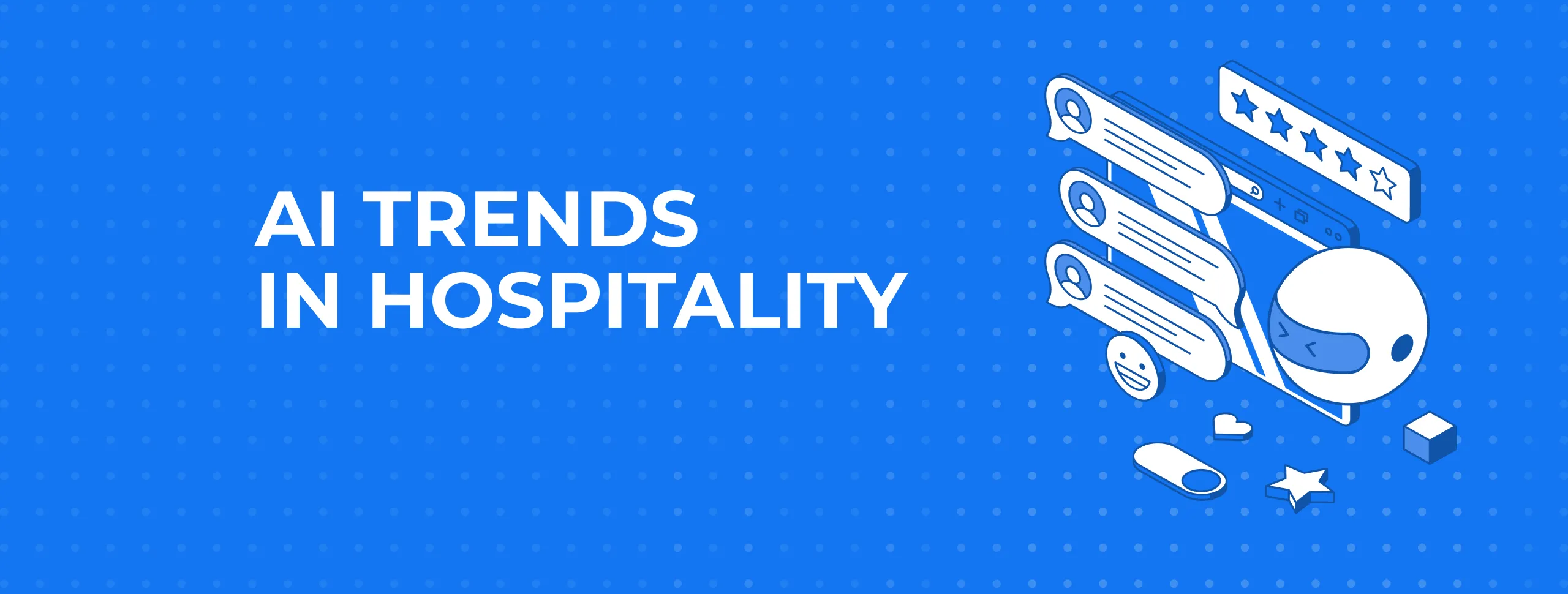
Emerging AI Trends Shaping the Future of Hospitality

Table of contents
- What is AI?
- AI Hotel Management Tools
- AI in the Hotel Industry
- Example AI Tools for Hotels
- Common AI Technology Among Hotels
- ChatGPT
- Smart Hotel
- Transforming Hospitality
- Advantages of AI in the Hospitality Industry
- Disadvantages of AI in the Hotel Industry
- Cost Estimation and Monetization for AI Tools in Hotels
- Choosing an App Development Company
- Conclusion
Thanks to artificial intelligence (AI) technology, hotels can now design more effective and individual guest management processes. Hotel staff can redirect their energy, time, and creativity to more crucial activities, delivering outstanding customer service instead of being consumed by routine and monotonous duties.
What is AI?
Artificial Intelligence refers to the replication of human intelligence functions by machines, particularly computer systems. It employs technologies such as computers and other devices to simulate the way the human mind makes decisions and solves problems.
AI Hotel Management Tools: Revolutionizing the Hospitality Industry
The hospitality sector is deeply immersed in rapidly changing technological innovations, reshaping business structures today. The management of hospitality establishments and guest feedback has significantly improved through the revolutionary use of artificial intelligence, making it a game-changer. Let's explore some tremendous effects of artificial intelligence on the prospective future of the hospitality industry.
Since 2014, several hotels have adopted robot concierges to assist customers. While it's challenging to evaluate the functional efficiency of these machines due to their limited use, one thing is certain: they generate significant word-of-mouth marketing for their companies.
According to the International Data Collection, 60% of hotels and 70% of travel agencies plan to incorporate artificial intelligence (AI) tools in the upcoming years, drastically transforming the hotel and lodging landscape. Though some may find this improbable, a Gartner survey revealed a staggering 270% global increase in the incorporation of AI, confirming the trend.
AI in the Hotel Industry
While AI in hotel management has the potential to improve customer experiences, its impact extends beyond guest encounters. It enhances operational efficiency in areas such as resource distribution, stock management, and income handling. Companies can make informed decisions based on data, optimize pricing options, and efficiently manage personnel for maximum revenue using AI-based statistics.
Furthermore, AI empowers the hotel and restaurant sector to understand more about the tastes, habits, and patterns of their clients. By analyzing consumer data, companies in the hospitality and tourism industries can identify trends, anticipate visitor demands, and consistently deliver personalized assistance and guidance. This level of customization enhances client feedback and fosters customer loyalty.
The development of artificial intelligence has the potential to completely transform every aspect of the hotel and restaurant industry.
Example AI Tools for Hotels
The use of artificial intelligence (AI) technologies in hospitality is diverse and continually evolving. Chatbots are increasingly serving as the first point of contact for many hotels, addressing visitor questions promptly and assisting with bookings. AI-driven accounting solutions are enhancing pricing strategies to ensure appropriate charges for hotel rooms. Additionally, housekeeping duties are being streamlined with cleaning robots controlled by artificial intelligence, ensuring efficiency and reliability.
Most visitors are unaware of the growth of artificially intelligent technology in hotels, primarily because its applications are concentrated in the administrative management of hospitality establishments, such as computerization and data analytics. Common AI techniques used by businesses include:
Providing Online Customer Service: Utilizing virtual support, including chatbots, software-driven social media communication, and push alerts, allows hoteliers to respond to client requests throughout the day and night, which is practically impossible with a person-to-person connection.
Customizing Services: Machine learning and artificial intelligence contribute to visitor customization, exceeding 20% satisfaction among customers. This involves developing personalized vacation itineraries, managing activities within the facility, and adjusting cuisine based on guest feedback.
Managing Revenue: AI and ML are highly effective in hotels' revenue planning, with a 60% customer satisfaction rate. Intelligent cost setting, automated booking processes, market segmentation, KPI monitoring, and competitor evaluation are entirely automated thanks to AI systems, ensuring ongoing success.
Maintaining Online Reputation: With over 80% of tourists checking reviews before making a reservation, hotels increasingly use AI to sustain their online reputations. Handling online customer feedback becomes a crucial aspect of maintaining high levels of company reputation.
Analyzing Data: AI is applied for overall data analysis, helping hoteliers pay closer attention to managing stocks, analyzing guest habits, predicting demand and sales, and more.
.webp)
Common AI Technology Among Hotels
Businesses, including hotels worldwide, are incorporating artificial intelligence systems for various purposes:
Energy-saving Intelligent Systems: Energy-saving heating and cooling systems, as well as in-room devices, provide guests with personalized convenience.
Facial Recognition and Check-in: Facial recognition expedites the identification process during check-in, benefiting both customers and employees.
In-room Voice Control Systems: AI-powered in-room voice control systems offer a practical method for guests to manage lighting, request room service, or obtain information about the area.
ChatGPT
ChatGPT is a noteworthy AI application for the hospitality industry, enabling one-on-one conversations with visitors. It can comprehend and generate natural language, assisting guests with questions, suggestions, and in-depth conversations.
Smart Hotel
The concept of a "smart hotel" is gaining popularity, incorporating AI-powered features such as voice-controlled rooms, robotic concierges, and interactive mirrors, providing visitors with greater autonomy over their time in the hotel.
Transforming Hospitality: The Synergy of AI and IoT
Individualizing Guest Experiences:
Artificial intelligence (AI)-driven chatbots and personal assistants respond instantly to visitor questions and offer customized suggestions for entertainment, recreation, and dining. Smart illumination and heating, examples of IoT-connected hotel room gadgets, allow visitors to personalize their stay.
Operating a Smart Room:
IoT sensors and gadgets in hotel rooms can change lights, temperature, and drapes instantly and automatically based on occupancy. Special apps on mobile devices or laptops grant visitors control over in-room facilities like television, drapes, and room service, contributing to energy savings.
Implementing Intelligent Maintenance:
IoT detectors monitor the operational condition of property and equipment, enabling AI to anticipate maintenance requirements and plan repairs in advance, reducing interruptions and downtime.
Saving Energy:
IoT solutions optimize electricity use by modifying heating, ventilation, air conditioning, and illumination based on occupancy, weather, and customer preferences, effectively reducing utility costs.
Controlling Access and Providing Full Security:
IoT-enabled control of access improves protection and accelerates registration procedures when paired with AI facial identification or biometric verification. AI-enabled video monitoring systems identify dubious behavior, prevent criminal activity, and unauthorized access.
Simplifying Stock Control:
Bars and dining establishments use RFID (Radio Frequency Identification) systems and IoT detectors to monitor and control inventories, ensuring timely supply of food and drinks.
Optimizing Work Load:
Chatbots and digital assistants driven by AI assist hotel workers by providing answers to frequently asked guest queries, allowing staff members to focus on more complex duties. Portable IoT gadgets enhance coordination and communication among hotel employees.
Managing Revenue:
Revenue management programs utilize AI to optimize costs and hotel capacity by analyzing market statistics, customer demand, and past booking trends.
Using Customer Feedback for Constant Improvement:
AI enables hospitality establishments to instantly address customer problems and discover areas for improvement by analyzing input from reviews and questionnaires.
Advantages of AI in the Hospitality Industry
The benefits of AI in the hospitality industry are manifold. AI enhances operational efficiency, reduces costs, increases revenue, and drives personalized guest experiences, leading to loyalty and positive reviews. Additionally, AI aids in data analysis, providing insights into customer preferences and behaviors for targeted marketing and service improvement.
.webp)
Disadvantages of AI in the Hotel Industry
While AI brings numerous advantages, it comes with drawbacks such as diminished human connections, potential employment losses, confidentiality concerns, and moral dilemmas. Striking the right balance between human contact and AI is crucial for optimizing productivity and guest satisfaction.
Cost Estimation and Monetization for AI Tools in Hotels
The cost of AI tools varies based on complexity, required options, system compatibility, and the development company's experience. Monetizing AI tools in hotels can be achieved through subscription-based models, in-app purchases, data monetization, and joint ventures.
Choosing an App Development Company
Selecting an experienced app development company is crucial for the success of AI projects in hotels. Factors such as knowledge, experience, portfolio, and customer feedback should be considered when making a choice.
Conclusion
As AI continues to transform the hospitality industry, hotels that embrace AI-driven tools stand to gain a competitive edge, offering guests unforgettable experiences and streamlining operations for long-term success. In this age of AI, the future of hospitality seems limitless.





